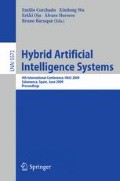Abstract
Terminal radar control is more and more complex in recent years. To reduce human errors in terminal radar control, an automatic system to support conflict detection and conflict resolution is required for reliable and safe terminal radar control. An anticipatory reasoning-reacting system for terminal radar control is a hopeful candidate for such systems. This paper proposes a methodology of decision-making in an anticipatory reasoning-reacting system for terminal radar control, presents a prototype of decision-maker, and shows that it can make appropriate decisions in anticipatory reasoning-reacting system for terminal radar control.
Access this chapter
Tax calculation will be finalised at checkout
Purchases are for personal use only
Preview
Unable to display preview. Download preview PDF.
References
Boeing Commercial Airplanes: Statistical summary of commercial jet airplane accidents (2008), http://www.boeing.com/news/techissues/
International Civil Aviation Organization: Growth in ATR traffic projected to continue. Technical report (2001)
Cheng, J.: Anticipatory reasoning-reacting systems. In: Proc. International Conference on Systems, Development and Self-organization, Beijing, China, pp. 161–165 (2002)
Cheng, J.: Temporal relevant logic as the logical basis of anticipatory reasoning-reacting systems. In: Dubois, D.M. (ed.) Computing Anticipatory Systems: CASYS 2003 - Sixth International Conference, Liege, Belgium, August 11-16, 2003. AIP Conference Proceedings, vol. 718, pp. 362–375. American Institute of Physics (2004)
Shang, F., Nara, S., Omi, T., Goto, Y., Cheng, J.: A prototype implementation of an anticipatory reasoning-reacting system. In: Dubois, D.M. (ed.) Computing Anticipatory Systems: CASYS 2005 - Seventh International Conference, Liege, Belgium, August 8-13, 2005. AIP Conference Proceedings, vol. 839, pp. 401–414. American Institute of Physics (2006)
International Civil Aviation Organization: Global air traffic management operational concept (2005), http://www.icao.int/
Senoguchi, A., Fukuda, Y.: An idea of altitude prediction model for conflict detection. Technical report, IEICE (2006) (in Japanese)
Nara, S., Shang, F., Omi, T., Goto, Y., Cheng, J.: An anticipatory reasoning engine for anticipatory reasoning-reacting systems. International Journal of Computing Anticipatory Systems, (CHAOS), 225–234 (2006)
Kitajima, N., Nara, S., Goto, Y., Cheng, J.: A deontic relevant logic approach to reasoning about actions in computing anticipatory systems, CHAOS. International Journal of Computing Anticipatory Systems 20, 177–190 (2008)
Tagawa, T., Cheng, J.: Deontic relevant logic: A strong relevant logic approach to removing paradoxes from deontic logic. In: Ishizuka, M., Sattar, A. (eds.) PRICAI 2002. LNCS, vol. 2417, pp. 39–48. Springer, Heidelberg (2002)
Cheng, J.: Strong relevant logic as the universal basis of various applied logics for knowledge representation and reasoning. In: Kiyoki, Y., Henno, J., Kangassalo, H. (eds.) Information Modelling and Knowledge Bases XVII, Frontiers in Artificial Intelligence and Applications, vol. 136, pp. 310–320. IOS Press, Amsterdam (2006)
Forbus, K.: Qualitative reasoning. In: CRC Handbook of Computer Science and Engineering, pp. 715–733. CRC Press, Boca Raton (1996)
Kitajima, N., Goto, Y., Cheng, J.: Fast qualitative reasoning about actions for computing anticipatory systems. In: Proc. Third International Conference on Availability, Reliability and Security, pp. 171–178 (2008)
Ministry of Land, Infrastructure, Transport and Tourism: Current states and issues of capacity of departure and arrival in tokyo international airport (in japanese) (2000), http://www.mlit.go.jp/
Fukuda, Y., Senoguchi, A.: Research and development on conflict alert function of air traffic control workstation (in Japanese). Technical report, IEICE (2006)
Author information
Authors and Affiliations
Editor information
Editors and Affiliations
Rights and permissions
Copyright information
© 2009 Springer-Verlag Berlin Heidelberg
About this paper
Cite this paper
Kitajima, N., Goto, Y., Cheng, J. (2009). Development of a Decision-Maker in an Anticipatory Reasoning-Reacting System for Terminal Radar Control. In: Corchado, E., Wu, X., Oja, E., Herrero, Á., Baruque, B. (eds) Hybrid Artificial Intelligence Systems. HAIS 2009. Lecture Notes in Computer Science(), vol 5572. Springer, Berlin, Heidelberg. https://doi.org/10.1007/978-3-642-02319-4_9
Download citation
DOI: https://doi.org/10.1007/978-3-642-02319-4_9
Publisher Name: Springer, Berlin, Heidelberg
Print ISBN: 978-3-642-02318-7
Online ISBN: 978-3-642-02319-4
eBook Packages: Computer ScienceComputer Science (R0)

